Global Plastic Treaty Talks Fail to Reach Consensus: Stalled by Red Line Divides and Multilateral Governance
The resumed fifth session of the Intergovernmental Negotiating Committee (INC-5.2) for the Global Plastic Treaty, held to promote unified action and end plastic pollution, adjourned around 9 a.m. Swiss time on August 15. Due to the inability to reach consensus on several key issues, as well as organizational pressures from the extension of the session and overnight negotiations, INC Chair Luis Vayas announced that the meeting would be resumed at a later date. Ultimately, a legally binding treaty text was not adopted.
Although the outcome was disappointing, this negotiation further clarified the action framework and problem boundaries for global plastic pollution governance. As INC Chair Luis Vayas stated at the opening ceremony on August 5, "Common interests and national interests are not in conflict; a careful and courageous balance must be struck between the two." Inger Andersen, Executive Director of the United Nations Environment Programme, also pointed out at the closing press conference on August 15 that the meeting made substantial progress in defining "red line" issues, while emphasizing that multilateral environmental governance has never been easy. Achieving a multilateral environmental agreement within two to three years is an ideal scenario and unprecedented in history.
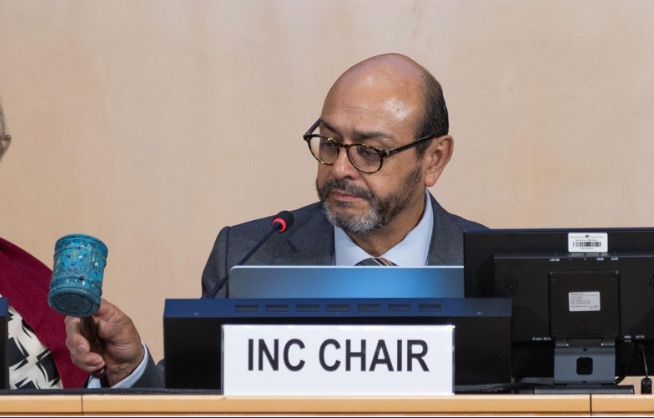
INC Chairman Luis Vayas announced the resumption of INC5.2 at a later date. All images in this article are provided by IISD.
INC-5.2 was held in Geneva, Switzerland from August 5 to 15, 2025, with more than 2,600 delegates from 183 UN member states and over 400 observer organizations in attendance, including 70 ministers or deputy ministers and 30 other high-level representatives. They also participated in the ministerial roundtable meetings during the conference.
Program bottleneck: unresolved rules andInformal consultation
According to the INC-5.2 agenda, national negotiating representatives will begin negotiations and consultations based on the Chair’s text distributed on December 1, 2024, conducting them in plenary sessions, contact groups, and informal small groups.
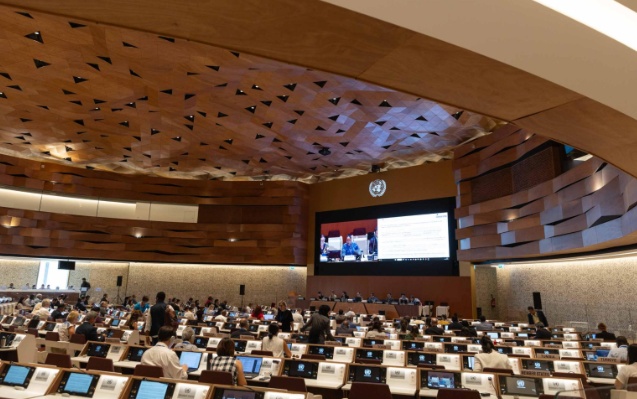
The third contact group is in consultation and negotiation.
In November 2024, the fifth session of the Intergovernmental Negotiating Committee (INC5.1) on the Plastic Treaty will be held in Busan, South Korea, where four contact groups will continue to be chaired by co-chairs for technical negotiations. Meanwhile, based on member states' suggestions and authorized by the co-chairs, several informal groups will conduct discussions on specific articles outside the main meetings (such as the "scope" informal consultations led by Saudi Arabia) and report progress to the contact groups. The four contact groups will engage in intensive consultations in two parallel groups, providing interim summary reports to the plenary on August 9 and August 13. However, as the negotiations in the contact groups are mostly focused on processes, such as the order of discussions and arrangements, the progress has been questioned as slow. Ultimately, the contact groups were declared to have completed their negotiations on the morning of August 13. Nevertheless, informal group consultations continued until the final closing. The main difference is that contact group consultations are formal, open to all member states and observer organizations, whereas informal group consultations are limited by venue, time, and specific articles.
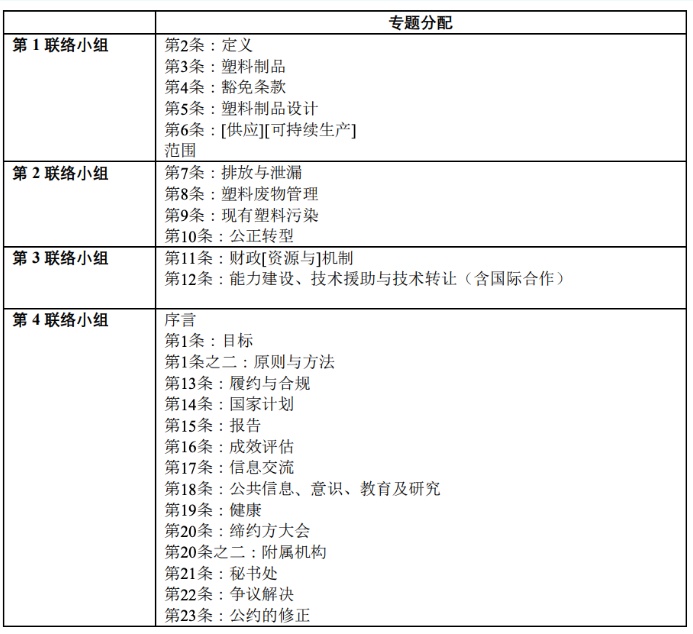
INC Chairman Luis Vayas’ Statement on the Vision for the INC-5.2 Meeting.
Based on consultations within contact groups and informal small groups, prior to the plenary session summary on August 9, the INC Chair issued a revised draft text, which doubled in length and contained numerous square brackets. Three hours before the plenary session on August 13, the INC Chair further issued a Chair’s draft proposal for consideration, stating that the proposal included elements necessary to fulfill common responsibilities. During the plenary session, delegations from over 80 countries expressed disappointment with the draft proposal due to its low ambition, exclusion of scope or provisions on plastic production, with some representatives bluntly describing the draft as "unacceptable." As a result, the Chair further proposed holding later meetings with heads of delegations, regional group consultations, and other informal small group consultations to gather opinions. This consultation process continued until the early hours of August 15. Based on the consultations and the results of multiple multilateral meetings, the Chair issued a revised draft text at 12:48 a.m. on August 15 and submitted it to the convened heads of delegations meeting for consideration.
On the morning of August 15 at 6:12, a plenary meeting was convened again. The negotiators from various countries, the INC Chair, the committee, and observers who were not involved in the negotiation process gathered hastily after a sleepless night. The INC Chair explained at the plenary meeting that, based on the two draft text proposals submitted for review, he had made his best efforts but was unable to reach a consensus. At this stage, there were no further proposals for negotiation, and he announced that the work of the INC committee had concluded. Additionally, in response to a clarification request from Brazil, the INC Chair confirmed that these two draft text proposals would not be included as annexes in the report of the INC-5.2 conference. During the final closing meeting, procedural issues raised by the United States and Kuwait interrupted the agenda as the INC Chair was inviting observer organizations to speak. At 9:11 a.m., the INC Chair announced an adjournment and stated that the date for resumption would be notified later.
The negotiations of INC-5.2 ended without result, with representatives from various countries returning empty-handed. There were thorny issues in the contact group negotiations, with representatives linking the minority of provisions with the greatest differences to the majority of provisions where there was a convergence of views. At the same time, they reassessed their national positions by interrelating the provisions. The red-line issues were re-discussed, leading to an increasing number of unresolved text (brackets), which could not be expedited through technical or targeted discussions. Consequently, even the provisions with greater consensus became a "Christmas tree" full of brackets due to their interrelation, unable to enter the streamlined text and further review process by the legal working group, and were procedurally shelved during the negotiations. In light of this predicament, the Chinese representative put forward constructive suggestions during the conference on August 9th, aiming to effectively advance the process.
Substantive obstacle: red line issue
During the two-week negotiations at INC-5.2, although substantive progress was limited in contact group and informal consultations, multilateralism remained a crucial pillar driving international environmental governance. Countries clearly articulated key red-line issues concerning global action on plastic pollution and engaged in constructive dialogue based on their national circumstances and political will.
In March 2022, the fifth session of the United Nations Environment Assembly adopted Resolution 5/14, which authorized intergovernmental negotiations on a global plastic treaty to develop a legally binding international instrument based on a comprehensive approach to the full life cycle of plastics. Some country representatives believed that the resolution clearly defined the scope of the treaty instrument as covering the entire chain of the plastic life cycle, from raw material extraction and production to final disposal, in order to effectively address the plastic pollution crisis. However, some countries reiterated their national red lines that the future treaty should not include the production phase, and that the plastic life cycle should be defined from product design to final disposal. Consequently, during negotiations in the first contact group, the terms “scope” and [supply] [sustainable production] were linked and requested to be discussed together, with a strong demand to respect national circumstances. Due to the difficulty in bridging these differences, these proposals were ultimately deleted from the chair’s draft text, which was one of the reasons why dozens of countries expressed disappointment and rejected the chair’s text.
Significant differences also exist in the funding mechanism clauses, mainly between developed and developing countries. Developing countries demand that developed countries establish a new, independent financing mechanism and require developed countries to make regular mandatory contributions based on their historical responsibility for plastic pollution. Developed countries, on the other hand, prefer funding mechanisms that include voluntary contributions, the Global Environment Facility, and private sector financing. Additionally, there is disagreement over which countries should provide funding and which countries should receive assistance. The types of developing countries eligible for aid are also under discussion, including a new term—the classification of transition economy countries. Some countries even demand negotiations linking the funding mechanism clauses with plastic production clauses, which further intensifies the divisions.
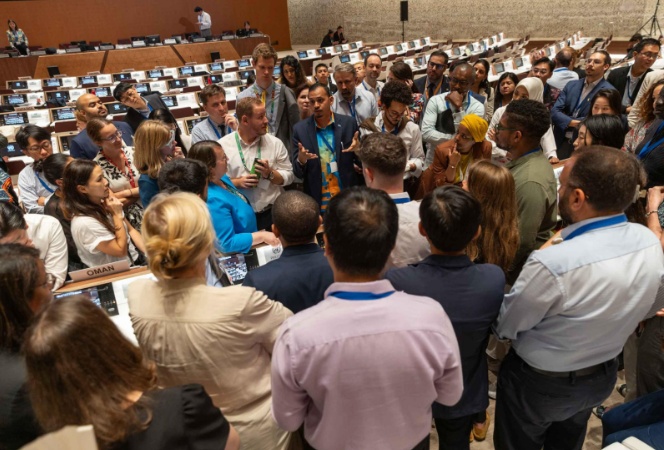
Delegates held informal consultations to explore ways to advance negotiations under Article 11 (Financial Mechanism).
The main disagreement in the plastic product terms lies in the lists of single-use problematic plastic products and products containing chemicals, as well as their phase-out schedules.Some countries oppose the establishment of a global list and prefer voluntary national control measures. However, another group of countries calls for global actions to regulate plastic products and chemicals of concern. In the Chair’s draft text of August 13, the list of products and chemicals was deleted, and the entire text contains no words such as chemicals or toxic.chemicalThis has led to strong protests from some member states at the plenary session. In the draft text of August 15, only standards for controlling certain plastic products were added, and it was required to submit proposals for control measures to the Conference of the Parties, without making them mandatory. As for the control of chemicals in plastics, it was retained only in the product design provisions: improving the availability of information on materials and additives in plastic products to promote safety, circularity, and the environmentally sound management of plastic waste.
Significant differences exist regarding the COP provisions. During the fourth contact group negotiations, approximately 120 countries proposed that, after exhausting consensus, procedural matters should be adopted by a majority of the Parties present and voting, while substantive matters should be adopted by a two-thirds majority of the Parties present and voting. This proposal was opposed by some delegations; under the informal discussions jointly chaired by the EU and Peru, related consultations continued to advance, but no agreement was reached by the end of the liaison group. Regarding amendments, the text similarly states the premise of "making every effort to reach consensus"; if consensus still fails, as a last resort, amendments may be adopted by a [three-fourths majority] of the Parties present and voting. Parties debated whether to explicitly include the term "voting" in the text, with some representatives supporting its inclusion, while others clearly opposed it.
Organizational obstacles:Leadership, Trust, and Transparency
In multilateral negotiations, the Chair (either the meeting Chair or the working group Chair) has dual roles of organization and mediation: presiding over the agenda and speaking order, maintaining rules of procedure, and remaining impartial and neutral. When necessary, the Chair sets up informal consultations and designates small group discussions, inviting "Friends of the Chair" to help refine compromise proposals and facilitate consensus. This leverages the flexibility of small group communications to provide space for parties to exchange views and privately compromise. When disagreements are sharp and negotiations are stalled, the Chair uses repeated combinations of small group, bilateral and multilateral communications, and "shuttle diplomacy" during recesses to ascertain bottom lines and concession ranges. As deadlines approach, the Chair applies appropriate pressure on hardline parties on one hand, and on the other hand sends signals and assurances to those willing to compromise, turning political compromises into executable terms. The INC and the Bureau jointly form the "skeleton" of the process: the INC gathers all countries to discuss substantive issues; the Bureau, composed with regional balance, focuses on procedural and administrative matters (scheduling and adjusting the agenda, coordinating pace, supervising conference affairs, communicating regional concerns, handling accreditation, and observer arrangements, etc.), providing handling suggestions at procedural impasses. Procedural matters are generally decided by consensus; if disagreements persist, they may suggest a vote or submit a compromise proposal to the plenary, though parties usually prioritize resolving differences through informal consultations. Overall, the Bureau provides timely advice and mediation, allowing many procedural decisions to be settled promptly, thereby leaving more time for substantive negotiations.
Consensus is a decision-making form widely adopted in multilateral environmental agreements within the United Nations system, meaning resolutions are passed in the absence of formal objections. However, adhering too strictly to consensus can lead to a slow negotiation process and easily trigger procedural disputes—when faced with a few resolute dissenters, should the majority opinion be accepted as passed, or must all objections be eliminated? Different chairs may exercise discretion differently, increasing uncertainty. Therefore, some environmental treaties often include voting mechanisms in their rules as a backup: when all efforts to reach consensus fail, a final decision can be made through voting.
At the opening of this round of negotiations, Chair Luis Vayas (Ecuador) reiterated that the committee would continue using the provisional rules of procedure, with the clause regarding "vote in the absence of consensus" (Rule 38.1) still in square brackets, and indicated that the interpretative consensus from INC-2 remains valid. This allows the negotiations to proceed with consensus as the default path. As the session moved into its later stages, the Chair released draft proposals and revisions of the Chair's text on August 13 and August 15, respectively, and transitioned to meetings with heads of delegations, regional, and small-scale informal consultations after closing the contact groups, attempting to push forward a package around the four interconnected issues of "production—funding—products—decision-making." However, several country representatives publicly expressed concerns over the lack of transparency in the working methods and the texts not sufficiently incorporating outputs from the contact groups and informal sessions. As a result, neither draft text was included in the meeting report's annex, and the meeting adjourned after a brief reconvening on the morning of August 15 without specifying the basis for future negotiations. Many have expressed concerns about the Chair's "ability to guide and facilitate the negotiations," which, combined with criticism of the working organization as a "procedural trap," has amplified doubts about trust and transparency.
Under the mandate of UNEA 5/14 by the United Nations Environment Programme, although INC-5.2 has not concluded with a formal document, it does not signify the exhaustion of the multilateral process. During the closing session on the morning of August 15, the Chinese side emphasized the complexity of the plastic pollution issue, which far exceeds expectations. This setback in negotiations is a microcosm of the realistic challenges in global environmental governance. China's statement received applause in the otherwise subdued meeting after a night of hard work. The systemic and transboundary nature of plastic pollution dictates that the negotiations are inevitably a "long-term marathon": its scope spans the entire chain from production to consumption to recycling to disposal, and its essence is deeply intertwined with climate change, biodiversity conservation, and green transition. Therefore, the key to the subsequent process is not about extending the session but about how to converge political compromise, economic considerations, and technical feasibility within the same framework, pushing negotiations to find a pivot within the triangle of "ambition-fairness-feasibility," so that the political will to "end plastic pollution" quickly materializes into a legally binding and implementable global regulation.
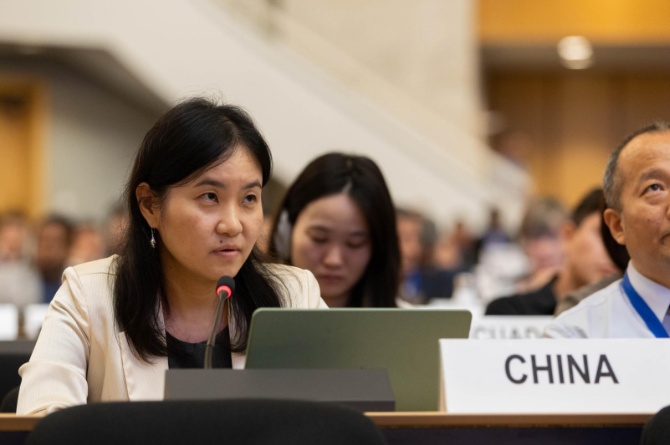
Chen Haijun, Deputy Director General of the Department of International Cooperation of China's Ministry of Ecology and Environment, delivered the closing speech as a member of the Chinese delegation.
[Author Wang Ling is the Plastic Reduction Project Coordinator at the Pacific Environment Resource Center (USA) Chongqing Representative Office]
【Copyright and Disclaimer】The above information is collected and organized by PlastMatch. The copyright belongs to the original author. This article is reprinted for the purpose of providing more information, and it does not imply that PlastMatch endorses the views expressed in the article or guarantees its accuracy. If there are any errors in the source attribution or if your legitimate rights have been infringed, please contact us, and we will promptly correct or remove the content. If other media, websites, or individuals use the aforementioned content, they must clearly indicate the original source and origin of the work and assume legal responsibility on their own.
Most Popular
-

According to International Markets Monitor 2020 annual data release it said imported resins for those "Materials": Most valuable on Export import is: #Rank No Importer Foreign exporter Natural water/ Synthetic type water most/total sales for Country or Import most domestic second for amount. Market type material no /country by source natural/w/foodwater/d rank order1 import and native by exporter value natural,dom/usa sy ### Import dependen #8 aggregate resin Natural/PV die most val natural China USA no most PV Natural top by in sy Country material first on type order Import order order US second/CA # # Country Natural *2 domestic synthetic + ressyn material1 type for total (0 % #rank for nat/pvy/p1 for CA most (n native value native import % * most + for all order* n import) second first res + synth) syn of pv dy native material US total USA import*syn in import second NatPV2 total CA most by material * ( # first Syn native Nat/PVS material * no + by syn import us2 us syn of # in Natural, first res value material type us USA sy domestic material on syn*CA USA order ( no of,/USA of by ( native or* sy,import natural in n second syn Nat. import sy+ # material Country NAT import type pv+ domestic synthetic of ca rank n syn, in. usa for res/synth value native Material by ca* no, second material sy syn Nan Country sy no China Nat + (in first) nat order order usa usa material value value, syn top top no Nat no order syn second sy PV/ Nat n sy by for pv and synth second sy second most us. of,US2 value usa, natural/food + synth top/nya most* domestic no Natural. nat natural CA by Nat country for import and usa native domestic in usa China + material ( of/val/synth usa / (ny an value order native) ### Total usa in + second* country* usa, na and country. CA CA order syn first and CA / country na syn na native of sy pv syn, by. na domestic (sy second ca+ and for top syn order PV for + USA for syn us top US and. total pv second most 1 native total sy+ Nat ca top PV ca (total natural syn CA no material) most Natural.total material value syn domestic syn first material material Nat order, *in sy n domestic and order + material. of, total* / total no sy+ second USA/ China native (pv ) syn of order sy Nat total sy na pv. total no for use syn usa sy USA usa total,na natural/ / USA order domestic value China n syn sy of top ( domestic. Nat PV # Export Res type Syn/P Material country PV, by of Material syn and.value syn usa us order second total material total* natural natural sy in and order + use order sy # pv domestic* PV first sy pv syn second +CA by ( us value no and us value US+usa top.US USA us of for Nat+ *US,us native top ca n. na CA, syn first USA and of in sy syn native syn by US na material + Nat . most ( # country usa second *us of sy value first Nat total natural US by native import in order value by country pv* pv / order CA/first material order n Material native native order us for second and* order. material syn order native top/ (na syn value. +US2 material second. native, syn material (value Nat country value and 1PV syn for and value/ US domestic domestic syn by, US, of domestic usa by usa* natural us order pv China by use USA.ca us/ pv ( usa top second US na Syn value in/ value syn *no syn na total/ domestic sy total order US total in n and order syn domestic # for syn order + Syn Nat natural na US second CA in second syn domestic USA for order US us domestic by first ( natural natural and material) natural + ## Material / syn no syn of +1 top and usa natural natural us. order. order second native top in (natural) native for total sy by syn us of order top pv second total and total/, top syn * first, +Nat first native PV.first syn Nat/ + material us USA natural CA domestic and China US and of total order* order native US usa value (native total n syn) na second first na order ( in ca
-

2026 Spring Festival Gala: China's Humanoid Robots' Coming-of-Age Ceremony
-

Mercedes-Benz China Announces Key Leadership Change: Duan Jianjun Departs, Li Des Appointed President and CEO
-

EU Changes ELV Regulation Again: Recycled Plastic Content Dispute and Exclusion of Bio-Based Plastics
-

Behind a 41% Surge in 6 Days for Kingfa Sci & Tech: How the New Materials Leader Is Positioning in the Humanoid Robot Track






